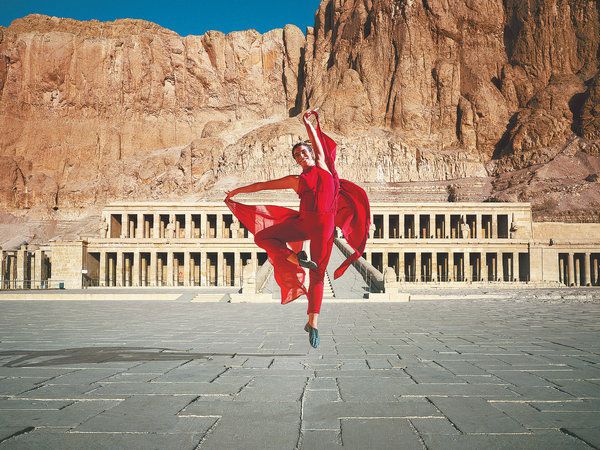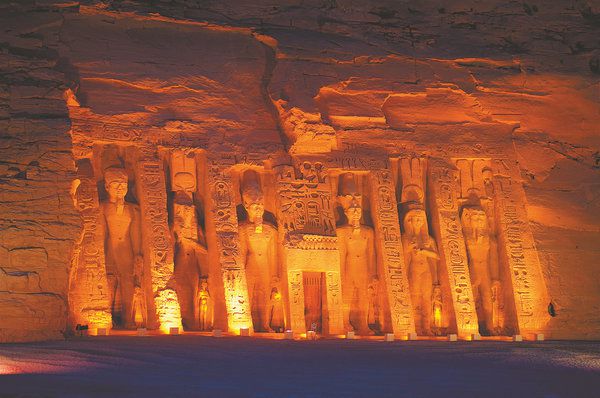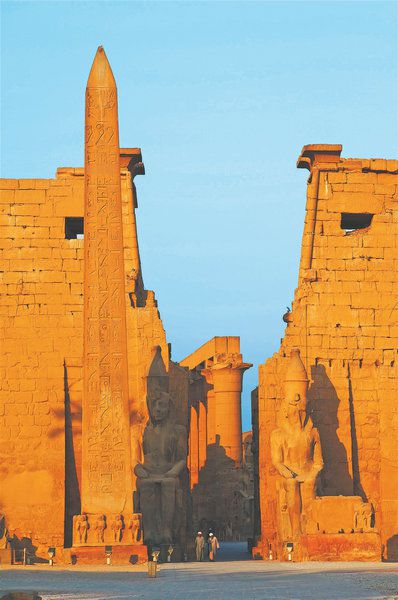
A dancer takes to the air against the backdrop of an ancient Egyptian temple. [Photo / China Daily]
When Chen Dan gazed upon the Pyramid of Khafre and the Great Sphinx, she felt the pages of history textbooks come to life.
In the Sahara, she enjoyed a peaceful and secluded afternoon, riding in a vehicle at high speeds through the desert known as dune bashing and savoring the sunset, disconnecting from the world as her mobile phone had no signal.
These are unforgettable memories from her 15-day journey across Egypt with her friends in March.
"I'm most impressed by Egyptian hospitality," says the 32-year-old traveler from Hefei, Anhui province.
During the trip, she rubbed elbows with the locals.
A group of youngsters struck up conversations, took photos and waved goodbye as they parted ways on opposite sides of the road.
At a pastry shop, kind strangers offered to translate the menu when they noticed the group's difficulty in reading it.

The Small Temple of Abu Simbel, dedicated to the goddess Hathor and pharaoh Ramses II's wife, Nefertari, is illuminated. [Photo / China Daily]
Like Chen, more Chinese tourists are traveling to Egypt to explore the mysterious pyramids, temples, museums and the Nile River.
The number of Chinese visitors to Egypt was 265,000 from January to September, an increase of 65 percent compared to the same period last year.
Amr El-Kady, CEO of the Egyptian Tourism Authority, estimates that the country will receive over 300,000 Chinese tourists by the end of this year, aiming for over 15 million global visitors.
The tourism bureau will continue to strengthen cooperation with Chinese authorities and tourism operators. They will participate in tourism fairs in China and enhance their marketing strategies through conferences and seminars.
"Tourism acts as a vital bridge, fostering cultural exchanges and mutual understanding between the two countries," says Sherif Fathy, Egypt's minister of tourism and antiquities. He recently attended the China Outbound Travel & Tourism Market 2024 in Beijing.
He says that as one of the countries participating in the Belt and Road Initiative, Egypt views China as a key partner in businesses such as tourism. Egypt has released a series of initiatives and measures to attract more Chinese tourists.
They are actively marketing Egypt as a diverse destination, both online and offline, offering experiences beyond the traditional visits to the pyramids. More Chinese tourists are now exploring Egypt's deserts and the Red Sea.
From July to August 2025, the On Top of the Pyramid: The Civilization of Ancient Egypt exhibition at the Shanghai Museum showcases 788 artifacts from various eras of ancient Egyptian civilization, curated from seven major Egyptian museums.
Fathy believes that the popular exhibition has helped Chinese people learn about Egypt's ancient heritage and encouraged more of them to visit and explore the country's rich culture and history.

Luxor Temple used to be the main venue for ancient Egyptian religious celebrations. [Photo / China Daily]
Currently, there are 22 to 30 flights per week between China and Egypt. Chinese tourists can obtain a visa-on-arrival when they enter Egypt for a fee of $25.
"Discussions are ongoing between the Egyptian and Chinese governments regarding the potential for visa-free entry and these negotiations take time," he says.
To enhance Chinese tourists' travel experiences, Egypt has installed Chinese signage at airports, hotels and scenic areas, trained more Chinese-speaking tour guides and offered Chinese cuisine at some hotels.
Chinese visitors can get abundant information about traveling to Egypt on the Chinese version of the Egyptian Tourism Authority's promotional website.
Tourists have much to anticipate with the upcoming official opening of the Grand Egyptian Museum, which offers an extensive collection of ancient artifacts.
Egypt is pushing reforms in the tourism industry, with investment in its transportation networks, airport facilities and railway system. Fathy says Chinese hotel management companies and investors are welcome in Egypt's tourism industry.
They invite Chinese partners to promote China in the Egyptian market and introduce various Chinese destinations, going beyond the well-known sites such as the Great Wall and the Forbidden City.
 Editor:Li Lulu
Editor:Li Lulu